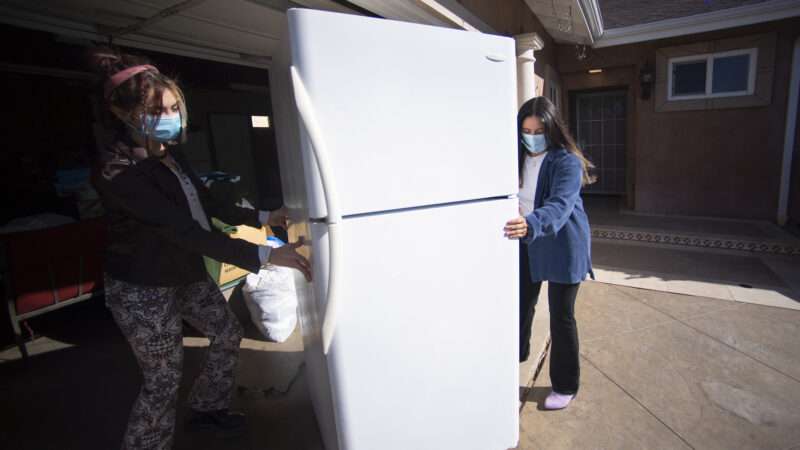

In September, a group of residents in Fort Worth, Texas, decided to do something to combat growing hunger in their city. They placed a refrigerator on a city street and stocked it with food that anyone in need could take and eat. For free. Months later, though, their efforts are in jeopardy due to an unwelcome combination of outdated laws and overzealous regulators.
At a time when millions of Americans can't afford enough food to eat—a result of the Covid-19 pandemic and the subsequent economic crisis—refrigerators stocked with free food are popping up on city streets around the country. These community fridges, as they're known, are similar in spirit and effect to the mutual-aid model that was once popular in this country. The spread of community fridges may be welcome evidence that that approach is making a comeback.
In October, for example, Today reported on the spread of community fridges, citing examples in Louisiana, Colorado, and New Jersey.
A community fridge in Tulsa, Oklahoma, is another example. "Anyone can come and pick up food and take it with them," says Ana Barros, who works with the group that sponsors Tulsa's community fridge. "It's open 24/7 basically take what you need, leave what you can."
In Phoenix, a new community fridge is located outside a popular coffee shop. In Denver, a group of ten volunteers maintains four community fridges in the city. In Wilmington, the nonprofit Planting to Feed launched Delaware's first community fridge last month, with hopes it will be the first of many statewide. And this week, the Boston Globe reported on a community fridge in Harvard Square. It's one of at least ten community fridges in the Boston area.
The growing interest in community fridges is obvious. Last week, for example, Mashable detailed ways to start a community fridge project or to support existing efforts.
Despite the fact that community fridges fill a vital need today and are exactly the sort of community-building and local self-reliance that America needs right now, these fridges are increasingly facing the ire of regulators.
As the aforementioned Today piece details, some community fridges are facing pushback from local regulators over perceived health and zoning violations. That brings us to Fort Worth.
That city's community fridge project was started by Kendra Richardson, a local high school teacher and activist, Eater's Brittanie Shey reported in September. Richardson's successful Funky Town Fridge project soon added two more community fridges. But, as Shey reported last week, the Funky Town Fridge project is in jeopardy now thanks to a perfect storm of inane (and inanely applied) state and local laws.
After allowing her to operate for months, Fort Worth officials informed Richardson that the community fridges violate what Shey rightly terms "an obscure, archaic law, passed in 1964, that is meant to prevent children from becoming stuck in airtight appliances."
To be fair, the law made sense at one point. Most early refrigerators could be opened only by an exterior latch. The fact these latches could not be opened from inside a refrigerator helped cause the deaths of many children, who suffocated while playing hide and seek or other innocent games.
As Eater's Shey notes, refrigerator safety features have improved dramatically since the 1950s, when Congress passed the Refrigerator Safety Act. The law was intended to ensure that children and adventure-seeking teens don't become stuck in and suffocate in an old, latch-reliant fridge. Indeed, most (if not all) modern refrigerators can be opened easily from inside, thanks to magnetic closures.
The Fort Worth law, hence, is largely irrelevant. It needlessly requires locks and human supervision. The community fridge model—24/7 access and no human supervision—runs counter to that law. (In a subsequent report last week, Shey noted that Fort Worth community fridges likely also violate Texas state law, which prohibits leaving a refrigerator "outside a structure.")
Fort Worth officials, who Shey reports say they're working to ensure Richardson's community fridges can continue to operate, now also claim the community fridges raise separate zoning and food-safety issues. That's perhaps why Shey also reports Richardson is skeptical of the city's purported goodwill, saying "she feels the city went looking for a law that would allow them to shut her down."
The Fort Worth community fridges wouldn't be the first to be shut down by overzealous regulators. In September, for example, San Diego volunteers were forced to remove a community fridge located outside a business that had welcomed and provided electricity for the fridge in part because the city determined "the fridge was not in compliance with charitable feeding operations guidelines."
That's shameful. As I detail in my book, Biting the Hands that Feed Us: How Fewer, Smarter Laws Would Make Our Food System More Sustainable, local ordinances that prohibit people from choosing to share food with the homeless and less fortunate are the basest form of lawmaking. Cities such as Fort Worth that invoke outdated (or just plainly inane) laws and regulations to crack down on community fridges during a time of great suffering should abandon these vile, counterproductive actions at once.
Read Entire Article Here: Reason Magazine Articles
via IFTTT
